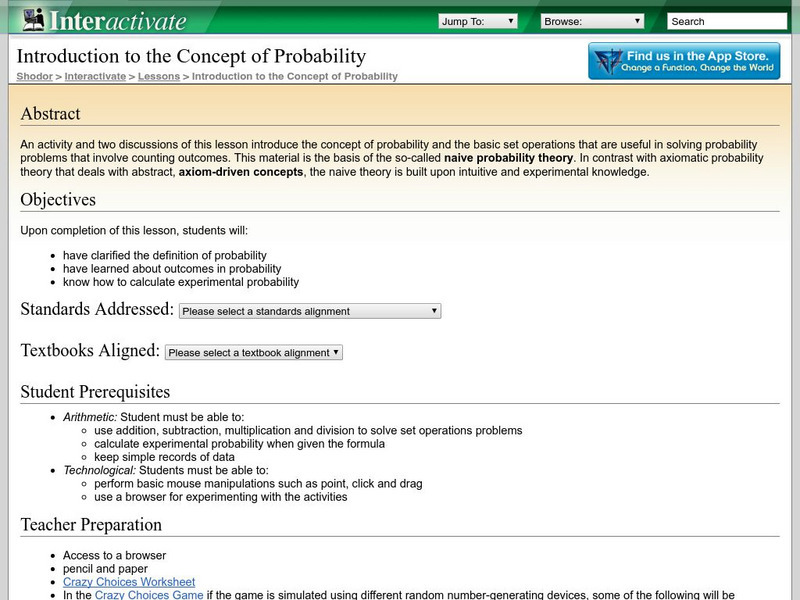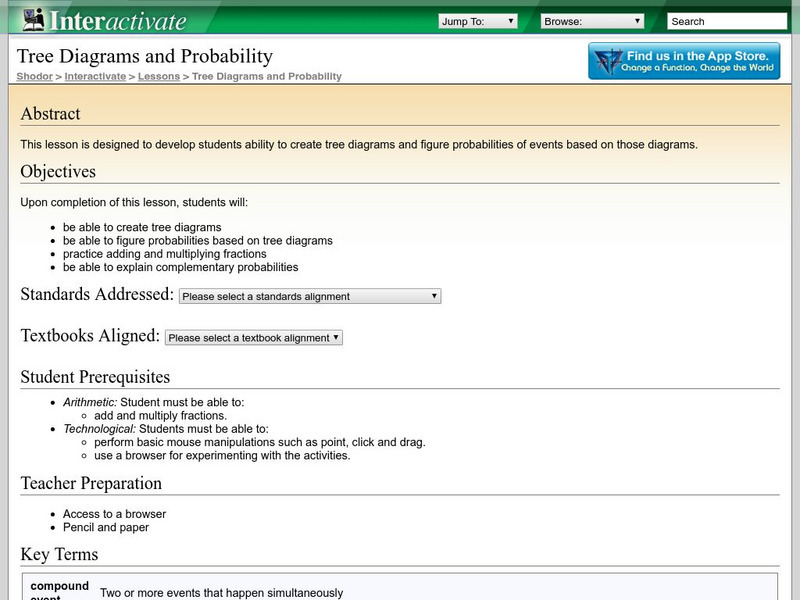Hi, what do you want to do?
Curated OER
Brian's Pegboard I
Third graders focus on developing a systematic approach to problem solving while working on a problem that requires them to determine possible outcomes. They use a pegboard as a manipulative in this problem.
Curated OER
Brian's Pegboard II
Students are able to assess a problem and use systematic methods to solve the problem. They also find out all the possible outcomes for a sequence of events using tree diagrams.
Curated OER
The Bell Curve
Students are introduced to the normal distribution and examine the bell curve controversy.
Curated OER
Lesson 56
Sixth graders practice Least Common Multiple in fractions. In this fraction lesson plan, 6th graders look at two different fractions and find a common denominator. They sing a song to memorize mean, median, and mode.
Curated OER
The Genetic Basis of Neurological Disorders
Young scholars explore neurological disorders. They examine the presence and absence of discernible genes. Students describe neruological diseases and draw faces of affected persons. They play a human neurology disorders learning game.
Curated OER
Chill Out
Young scholars investigate Newton’s Law of Cooling. In this Algebra II/ Pre-Calculus lesson, students explore exponential regression as they conduct an experiment to simulate the temperature variations that occur as a liquid...
Curated OER
Coin Shake-Up
Students discuss problem and take turns in pairs, one tossing the coins while the other guesses whether the coins land with the same side up or different sides up. They record the results of each guess as same or different.
Curated OER
Something Rotten in West Bloomfield!
Student groups seek a possible ecological problem in the West Bloomfield area then either photograph or videotape the problem. They investigate how to measure the extent of the problem and do it.
Curated OER
The Genetic Basis of Neurological Disorders
Young scholars describe some aspects of known genetic defects on the human neurological condition. They participate in a variety of exercises including drawings, games, and analogies.
Alabama Learning Exchange
Alex: Probability What Are the Odds?
This lesson introduces middle schoolers to experimental and theoretical probability using spinners and trials with pennies. Students also research careers that involve probability, and create a video presentation. It provides an...
Shodor Education Foundation
Shodor Interactivate: From Probability to Combinatorics and Number Theory
Apply division to determine the probability of outcomes with a racing game.
PBS
Pbs Mathline: The Smithville Families Lesson Plan [Pdf]
A coin is used to determine the birth of children and the middle schoolers are to determine the probability of whether the child is boy/girl. Printable lesson.
Alabama Learning Exchange
Alex: Probability What Are the Odds?
This lesson introduces the student to the concept of probability. Students will explore the meaning of theoretical and experimental probability by viewing interactive websites. A lab activity will be performed using cooperative learning...
J Coffman
Joseph Coffman's Lecture Notes: Probability
The instructional activity examines probability. Students learn about simulations, theoretical probability, and geometric probability. Definitions, formulas, examples, and a quiz are included.
Shodor Education Foundation
Shodor Interactivate: Playing With Probability
This lesson plan teaches young scholars about theoretical and experimental probability through a series of work stations.
Shodor Education Foundation
Shodor Interactivate: Lesson: Ideas That Lead to Probability
This lesson plan sets the ground work for an introduction to and then exploring the concepts that are the foundation for probability. Lots of resources are available for teachers and learners at this website.
Shodor Education Foundation
Shodor Interactivate: Lesson: Intro to the Concept of Probability
The Shodor Education Foundation provides this lesson plan to introduce students to the concepts of probability. Students learn about the definition of, outcomes in, and calculations of experimental probability. Students use an...
Shodor Education Foundation
Shodor Interactivate: Lesson: Tree Diagrams and Probability
This lesson plan helps students develop tree diagrams and figure probability of events based on diagrams. Lots of resources are available to support teachers and students at this website.
Shodor Education Foundation
Shodor Interactivate: Lesson: Conditional and Simultaneous Probability
This lesson plan deals with conditional probability and the probability of simultaneous events. Problems included in this lesson tend to have solutions that are counterintuitive. This presents an opportunity to investigate more deeply...
Shodor Education Foundation
Shodor Interactivate: Probability: Playing With Fire
Learners use probability to determine how likely it is for each tree in a small simulated forest to catch on fire.
Better Lesson
Better Lesson: Theoretical vs Experimental Probability
Sixth graders will be able to see the relationship between theoretical probability and experimental probability by computing both at the same time.
OER Commons
Oer Commons: Compound Events & Sample Spaces
Seventh graders begin learning about compound events by considering independent events. They will consider everyday objects with known probabilities. Students will represent sample spaces using lists, tables, and tree diagrams in order...
Shodor Education Foundation
Shodor Interactivate: Probability
Young scholars learn about probability by predicting the outcome of planned experiments and playing racing games.
Other
The Actuarial Foundation: Are You Game? [Pdf]
Games are designed to help students understand and apply concepts of probability. determine fairness.
















![Pbs Mathline: The Smithville Families Lesson Plan [Pdf] Lesson Plan Pbs Mathline: The Smithville Families Lesson Plan [Pdf] Lesson Plan](https://static.lp.lexp.cloud/images/attachment_defaults/resource/large/FPO-knovation.png)




